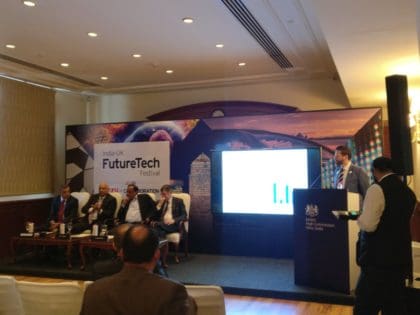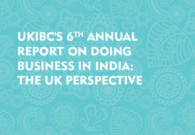Manufacturing: The Fourth Industrial Revolution in India
Will Indian manufacturing adapt to the world of Industry 4.0 or define it? How can India differentiate itself in a globally competitive sector? What will be the most disruptive technology?

These were the questions at play at the India-UK FutureTech Festival last week as leading corporate honchos, policymakers, and academics formulated the strategies to take India’s manufacturing capabilities to the tech-level.
Manufacturing is ripe for India-UK tech collaboration. India’s ambition is to take its manufacturing sector from 15% currently to 25% of GDP by 2022 – no small challenge, but one that can deliver jobs, economic growth, and world-leading innovation. Carving out success in such a globally competitive sector, however, will rely on collaborations that locate the epicentre of the Fourth Industrial Revolution in India. The UK, with its high-value manufacturing expertise and cutting-edge innovation programmes, can help India bridge that gap, and in an emerging era of digital manufacturing, both nations can benefit by leveraging India’s acclaimed IT skillset.
The India-UK FutureTech Festival underscored why it’s imperative for the two nations to combine forces.
Clive Hickman, Chief Executive of the Manufacturing Technology Centre (MTC), in Coventry, stressed the potential of automation to minimise errors and improve quality. While human performance suffers due to personal problems,
“robots don’t have to worry about family life”.
Far from the misleading language of mass layoffs, automation will in fact create opportunities for employees to move to higher value jobs. As such, the advantages of unleashing digital manufacturing are double-edged — improving quality whilst ensuring employees are free to deliver higher productivity. For India to seize both, adopting automation needs to be coupled with employee up-skilling programmes.
Indeed, President of Rolls-Royce South Asia and India, and UKIBC India Board Member, Kishore Jayaraman, observed that job skills required in manufacturing are ever changing, so an ecosystem needs to be developed in India to enable and enhance that process sustainably.
This is just one example of how the manufacturing model India adopts now will define how and if its ambitions are met in the future. Indeed, Jayaraman, stressed that, while India needs to continue being competitive on the cost arbitrage curve, it should also scale up its delivery of value arbitrage to avoid being locked into a model that builds cheap products that break quickly. By using digital manufacturing techniques to make “great-cost products that last longer” than those of competitors, Indian manufacturing will stand out globally.
A highlight of the Festival’s ‘Future of Manufacturing’ session was Hickman demonstrating exactly what the UK’s capabilities are in delivering world-leading digital manufacturing potential. A ‘wow’-inducing virtual tour of the cutting-edge MTC facility showcased augmented reality simulators, intelligent automation, additive manufacturing, and laser processing. The MTC bridges the gap between research and commercialisation by developing integrated manufacturing systems solutions for a wide range of businesses, from automotive and aerospace and electronic and computing to food and drink. The MTC is just one among the wider group of seven centres forming the High Value Manufacturing Catapult, supported by Innovate UK.
It is world-leading collaborative research in the UK such as this that offers unrivalled opportunities to leapfrog digital manufacturing in India. Nik Khanna, MD of aerospace and defence giant, BAE Systems, highlighted how the initial seeds of high value manufacturing catapults in India are already taking shape in leading Indian institutions including IIT Madras, IIT Bombay and IISC Bangalore.
In the first steps to delivering this, UK India Business Council (UKIBC) organised a high-level meeting the day before the FutureTech Festival between large manufacturing corporations and government officials from both countries to explore collaboration in developing catapult-style technology centres in India. This meeting set an optimistic tone for participants entering the Futuretech Festival, representing an important step towards connecting the UK’s catapult capabilities with India’s technology development ambitions.
Building on bespoke sessions using technology to engage business leaders and thinkers on the questions that need to be answered, the next step is to actually propose the models that will facilitate technology transfer from the UK to India.
While the opportunities are immense, and immensely exciting, there do however remain barriers to successful manufacturing collaboration between the UK and India. The encouraging news is that the Government of India wants to address them, so in 2019 the UKIBC will be working with the Department of Industrial Policy and Promotion, Invest India and, indeed, state governments to examine and remove the remaining market access barriers.
By catalysing UK-India collaborations through occasions like the FutureTech Festival and the UKIBC’s sustained efforts in the sector, world-leading collaboration in digital manufacturing is rapidly becoming a reality in India.
This is the second blog in our FutureTech series: a collaboration between Jaideep Dave from Magenta Communications and the UKIBC, after attending the India-UK FutureTech Festival 2018.
Our next, and final, blog will look at the India-UK collaboration opportunities in the healthcare sector, whilst you can read our previous blog ‘India at the Cusp of Data Revolution’ here. Stay tuned!
The India-UK FutureTech Festival 2018
UKIBC hosted a televised session at the India-UK FutureTech Festival in Delhi this past December kindly hosted by the Department for International Trade (DIT). The panellists included Taneia Bhardwaj, Anchor & Senior News Editor, ET NOW, Richard Heald, UK India Business Council, Dr Ashutosh Natraj, CEO, Vidrona, Larry Stone, Chairman, BT India, Bipin Preet Singh - Founder CEO – MobiKwik, Ron Mobed, Chief Executive Officer, Elsevier and Kshitij Shah, Principal, 3one4.
Credit for these photos goes to the 'UK in India' (their full album of photos from the FutureTech Festival can be found at the UK in India flickr account).







